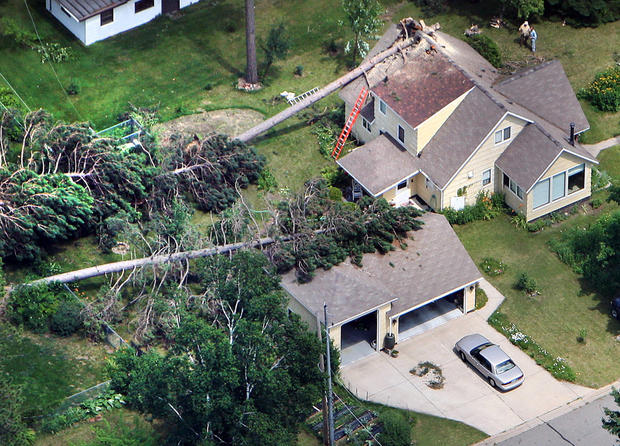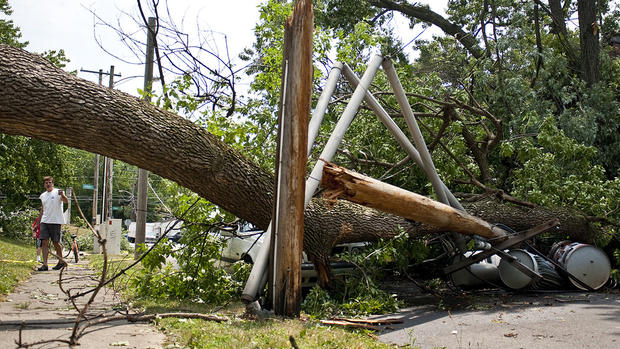5 days after storms, outages, heat wave persist
(CBS News) WASHINGTON -- Many Americans will celebrate July 4th sweating under high temperatures, due to a brutal heat wave that just won't quit.
Warnings and advisories are up from the East Coast to Midwest. Forecasters say the mercury will hit 105 in St. Louis Wednesday.
It's not supposed to be quite that hot in the East, but it'll still be another hard day for about one million utility customers who lost their power in violent storms Friday.
The fast-moving storms barreled their way through seven states and the District of Columbia.
Temperatures in those areas were forecast to be back up in the 90s Wednesday.
And on day five post-storms, efforts to clean up and restore power were growing more desperate.
"It's a huge mess," Virginia resident Terry Savella understated. She still had no power in her home Tuesday.
But she's staying focused on the positive, saying, "We've been sweating it out in the basement, but (there's) no damage to our house, so I feel for the people who've had trees fall on their houses."
People such as Suzette and Michael McGrann: A tree crashed through their bedroom as they were watching a movie Friday night. "It sounded like a train coming through yhour house," Michael says.
"Honestly, I thought it was a tornado," Suzette rercalled.
No one in the McGrann household was hurt.
Heat wave raises warning signs for climate change scientists
Anger festers in sweltering Mid-Atlantic
Power outages in East could last a week
Sweltering heat, no power: Dangerous 1-2 punch
Storm-felled trees block Md. elderly from leaving their homes
Eastern storms leave 22 dead, 2M still in dark
Historic heat wave meets mass power outages
Mid-Atlantic power outages could last days
Residents without electricity around the region continued looking for ways to cool off, and charge up.
A library in the Maryland suburbs has been packed since the power went out.
As the outage continues, Maryland's governor, Martin O'Malley, wants residents to alert the power companies, to help pinpoint where resources need to go. "We now need for citizens to call the utility companies and let them know your house is still out," he says.
Homeland security experts are looking at last week's surprise storm as a test run for what could happen in the event of a malicious terrorist attack - a test run that so far has failed.
"It's completely unacceptable to not have these basic needs met for an extended period of time," asserts Dan Kaniewski, who was a disaster response adviser to President George W. Bush.
He handled the recovery after Hurricane Katrina and says events like this week's storm have exposed weaknesses in infrastructure, as several power companies are still struggling to bring residents back online.
"Widespread, sustained power outages are among the top concerns of homeland security officials," Kaniewski says. "And I know for a fact this type of scenario keeps them awake at night."
Among the things experts like Kaniewski have recommend is that individuals stock up and be prepared to survive on their own for up to 72 hours, because the private utility companies may have not proven yet that they're ready to handle a massive outage.
Many people are asking why power lines are left above-ground and vulnerable to the elements and falling trees. Why not put them below-ground?
The simple answer: cost -- up to $15 million per mile to make that change, totaling billions of dollars in the Washington area alone.
To see Whit Johnson's report, click on the video in the player above.

